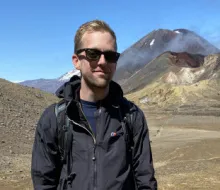
Research Interests
My research interests are focused on applying process-based sedimentology to a range of applications including:
1. Better understanding how onshore sediment transport systems link to those in the deep sea, including the controls played by ocean currents on pollutant dispersal (e.g. microplastics)
2. Characterising seafloor geohazards, such as submarine landslides and turbidity currents, and determining how they are preconditioned, triggered and evolve downslope
3. Quantifying the rate and flux of deep sea sediment transport over timescales from minutes to millions of years, including the role played by climatic variations
4. Assessing risks posed to globally important seafloor infrastructure, such as telecommunications cables and pipelines, by submarine geohazards
5. Linking modern seafloor processes with ancient geological archives through integration of direct monitoring, repeat seafloor surveys, and sedimentary analysis
I work with a combination of data from outcrop and sediment cores, high resolution marine geophysical data, evidence of disruption and damage to infrastructure (e.g. cable breaks), and novel application of marine sensors to monitor sediment transport and geohazards, from sites spanning lakes, to fjords and the deep sea.
Current PhD students (*denotes lead supervision):
- Mohammad Zaki Zulkifli* - Monitoring and modelling geohazards in active submarine channels (Knight Inlet, Lake Geneva, Congo Canyon)
Previous PhD students:
- Lewis Bailey* - Triggering and preconditioning of turbidity currents (Bute Inlet, Monterey Canyon & East Africa)
- Daniela Vendettuoli* - Linking active turbidity currents with their deposits and stratigraphic evolution (Squamish delta and Congo Canyon)
- Maarten Heijnen* - Morphodynamics of submarine channels and their evolution (Bute Inlet & Congo Canyon)
- Age Vellinga - Morphodynamics of cyclic steps in rivers and submarine channels (numerical modelling)
- Ed Pope - Triggers and consequences of powerful turbidity currents related to earthquakes, cyclones & climate change (Arctic margin and global database of cable breaks)
- Josh Allin - Frequency of large submarine landslides and turbidity currents (Norwegian margin and NW Atlantic canyons)
- Maria Azpiroz - Hydrodynamics of field-scale turbidity currents (Congo Canyon & Black Sea)
- Sophie Hage - Linking turbidity current monitoring to deposits and organic carbon burial (Squamish delta)
- Jamie Hizzett - Quantification of the near-bed behaviour of turbidity currents (experimental studies)
Marine Environmental Advisor to the International Cable Protection Committee
NOC Representative on Natural Hazards Partnership (Steering group to the UK Cabinet Office on natural hazards)
Member of Offshore Engineering Geology, Geophysics and Geomorphology Working Group (of the Engineering Group of the Geological Society of London)
Associate Editor - Frontiers in Earth Science
Member of Deep Ocean Stewardship Initiative: Pollution & Debris Working Group
Advisory Board Member to British Ocean Sediment Core Research Facility (BOSCORF)
Associate Chair to IGCP-640 S4SLIDE project "Assessing Geohazards, Environmental Implications and Economic Significance of Subaqueous Landslides across the World’s Continental Margins"
NOC Representative on AURA Renewables Innovation Hub
"Explosive post-caldera collapse eruptions in the Kermadec-Tonga Arc. NERC (NE/X003272/1:). Co-I. £100k. 2022.
ECOWind-ACCELERATE - assessing seafloor and ecological effects of offshore wind. NERC. Co-I. £2.5M. 2022.
"Offshore hazard cascades from the largest volcanic eruption this century" NERC (NE/X00239X/1). PI. £100k. 2022.
"Improving resilience for telecommunication cable links to Small Island Developing States in the Caribbean", Commonwealth Marine Economies. PI. £100k. 2021.
"Climate change hotspots and the global telecommunications network: Assessing past and present resilience, and adaptation strategies for the future" NERC. PI. £170k. 2021.
"Sources and pathways of plastics in the marine environment" Directed funding. Co-I. £35k. 2021.
"Autonomous Techniques for infraStructure Ecological Assessment" NERC (NE/T010649/1) Co-I. £670k. 2020.
"Failure mechanism and tsunamigenesis of the Anak Krakatau landslide on 22 December 2018" NERC (NE/T002034/1). Co-I. £78k. 2019.
"Developing a Global Listening Network for Turbidity Currents and Seafloor Processes" NERC (NE/S010068/1) Co-I. £700k. 2019.
"Seafloor Currents and Micro-plastics Investigation" (SCaMpI)". Co-PI. Collaboration with University of Manchester, IFREMER, MARUM/Bremen University & Utrecht University.
"Environmental Risks to Infrastructure: Identifying and filling the gaps" (NE/P005780/1). 3 year NERC Knowledge Exchange Fellowship. £350k. PI. 2016.
“What threat do turbidity currents and submarine landslides pose to strategic submarine telecommunications cable infrastructure?”. NERC. (NE/N012798/1). £140k. Co-I. 2016.
“New field-scale calibration of turbidity current impact modelling” (NE/P009190/1). NERC. £140. PI. 2017.
"What threat do submarine landslides pose to Small Island Developing States?", NERC ODA follow on funds. £20K. PI. 2017.
"Direct monitoring of turbidity currents". Joint Industry Project. £300K. PI. 2017.
"Submarine Landslides and Their Consequences for European Margins" £300K of £3.5M Marie Curie H2020 ITN. NOC PI. 2017.
"Quantification of triggers, frequence and impact of marine geohazards for Tanna Island, Vanuatu". £50K of £5.6M Commonwealth Marine Economies Programme. 2018.
"Climate Linked Atlantic Sector Science". NERC National Capability funding. £22M total project. NOC lead for Whittard Canyon mooring and sediment transport analysis.